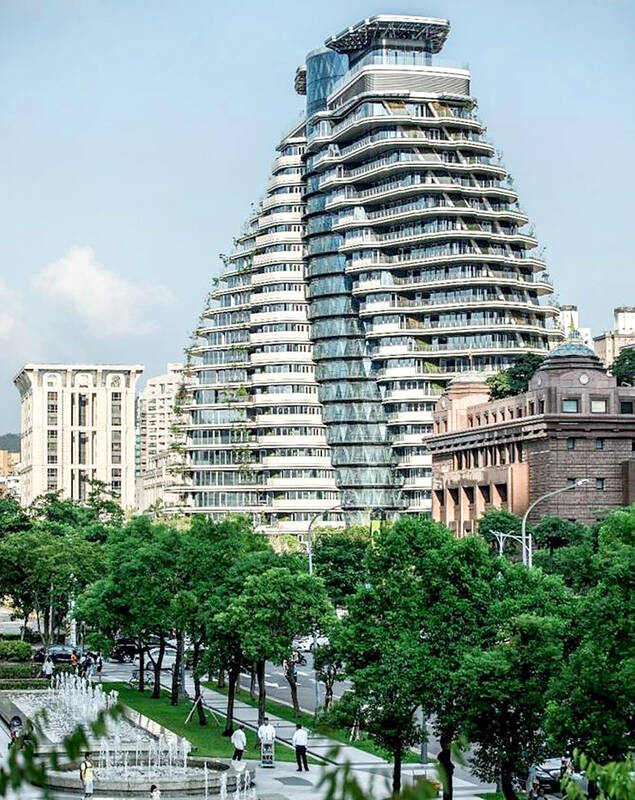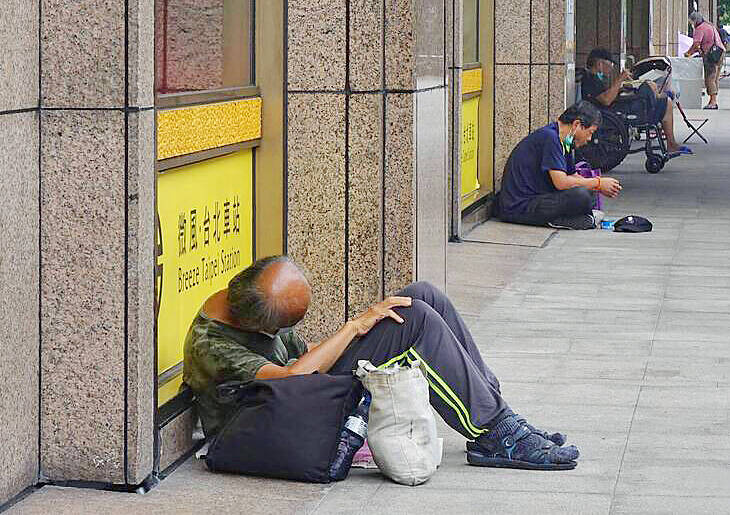From the last quarter of 2001, research shows that real housing prices nearly tripled (before a 2012 law to enforce housing price registration, researchers tracked a few large real estate firms to estimate housing price behavior).
Incomes have not kept pace, though this has not yet led to defaults. Instead, an increasing chunk of household income goes to mortgage payments. This suggests that even if incomes grow, the mortgage squeeze will still make voters feel like their paychecks won’t stretch to cover expenses.
The housing price rises in the last two decades are now driving higher rents. The rental market is largely an underground market, almost totally free of government regulation. Landlords routinely evade taxation simply by not reporting renters, which renters agree to because it results in lower rent. The government did put in some tough new electricity price rules last summer, but at present there are no plans to regulate rapidly rising rents.

Photo: Hung Mei-hsiu, Taipei Times
PERNICIOUS EFFECTS
The underground nature of the rental market has many pernicious effects. For example, people typically rent for years in one city, but vote in another, which means they do not have political rights in the city where they live. This is viewed as normal. Indeed, proposals for absentee voting hinge on widespread social acceptance of living in City A but being registered and voting in City B. This means that absentee voting laws, which look like a redress of civil rights, are in reality a subsidy for landlords to evade taxes.
The real issue is not that people must travel to vote, but rather, that landlords won’t let them register their households locally. Absentee voting laws are thus another striking example of how construction-industrial state governance uses subsidies to address the symptoms of social problems without solving them.

Photo: TT file photo
As scholars John Chung-En Liu (劉仲恩) and Ke-Hsien Huang (黃克先) observed in a paper on energy poverty in Taipei’s rooftop apartments, landlords have little incentive to invest in energy savings, and can still profit from inflated electricity charges. The result is “energy poverty,” another injustice of unregulated rental markets.
IMPACT ON THE HOMELESS
Homeless Taiwan (homelesstaiwan.org) regularly conducts surveys and publishes analyses of homelessness. When people think about housing issues for the homeless, “what comes to mind are two policies: rental subsidies and public housing,” they write. Yet both are failures for the homeless and other disadvantaged groups.

Photo: TT file photo
For example, they note that though the homeless are one of the 12 officially recognized disadvantaged groups under the subsidized leasing and property management program and can get lower rents, most units still cost nearly or over NT$10,000 per month after discounts. There is no affordability standard. Demand for such units far exceeds supply, which is distributed by lottery.
According to Homeless Taiwan, in social housing units, the lowest rent for a single studio apartment starts at around NT$5,000. This figure does not including moving-in costs — utilities, cable TV, furniture rental and similar. Hence, merely moving in costs NT$10,000 up front.
“In fact,” Homeless Taiwan writes, “we’ve had clients give up their lottery spot after doing the math. They would rather rent a smaller room for NT$5,000–6,000 and wait for rental subsidies to ease their expenses.”
But can they get rental subsidies? Any room under 3.95 pings is excluded from rental subsidies. Most rooms that size are in illegal buildings. The result is that the most disadvantaged populations, desperately in need of subsidies, can’t receive them because they live in illegal structures.
“Forty seven point three percent of our clients could not receive subsidies because their rentals were in illegal buildings,” writes Homeless Taiwan.
Even in larger apartments, if a renter applies for subsidies, landlords may simply refuse to renew the lease, or spike the rent in retaliation. The underground nature of rentals increases renters’ precarity.
Nor did the subsidies prove enough to bring landlords into the tax office. Homeless Taiwan has found that because homeless people cannot register their household in the city in which they live, more than 90 percent cannot receive aid.
The rental subsidy issue is tied to the definition of poverty, which varies by city and county. It is also defined by an “imputed income” rule first developed in 1963 under martial law and formally made law in 2004. Under this retrograde rule, income is imputed to poor people, who are assumed to be earning minimum wages, or at least factory wages. This denies aid to the poor. Moreover, because the “poverty line” is a threshold, if a poor family’s income rises and crosses that threshold, all aid ceases. One expert cited by Homeless Taiwan said that the concept of imputed income is a sign of government laziness and avoidance of investigative responsibility. Fortunately in 2011, the poverty line was raised, bringing in over 500,000 disadvantaged.
PERMANENT RENTER CLASS
The ideology of home ownership, fostered by the government, leads only to more poverty, argued Hong Ji-shu (洪敬舒), director of research for the Taiwan Labor Front, in an excellent 2022 opinion piece in United Daily News (UDN). Hong contends that the twin effects of saving for home buying, and lowered personal consumption for the sake of saving, have powerful crowding-out effects, effects “directly deferred to the next generation.” This suggests that we are near the emergence of a permanent renter class, as newcomers to housing markets are priced out of owning a home, making things like rent subsidies and poverty lines politically salient to a growing class of people.
Not only does social mobility suffer, but Hong instances a 2017 report from the Construction and Planning Agency of the Ministry of the Interior on housing affordability that showed that the national total fertility rate and mortgage affordability are negatively correlated.
The result is a double whammy: high mortgages reduce consumption, in turn reducing economic growth, but the resulting lowered fertility rates also reduce economic growth. To simplify an economic formula known to every economist, economic output = productivity output growth + labor growth. Thanks to high housing costs among other factors, labor growth in Taiwan is now negative: our population is falling. The economy will follow.
This ideology of ownership is also directly tied to renters’ experiences. For many people, as a May 2024 CommonWealth magazine piece musing on whether Taiwan could become a rental society observed, home ownership frees renters from the fear and instability induced by arbitrary rental price hikes.
The obvious move would appear to be a sweeping regulation requiring landlords to register rentals, but things are not so simple. Thousands of illegal apartments (think of Taipei’s jungles of illegal rooftop walkups) would have to either be legalized or eliminated, raising rents and reducing housing availability. Short of physically checking every building in Taiwan, landlords would still find it easy to evade taxes.
“Taiwan’s housing has a unique combination of high homeownership rates, high vacancy rates and high housing prices — the three highs,” said Chen Yi-ling (陳怡伶), an expert on Taiwan housing currently at the University of Wyoming, in a recent book chapter.
To those must now be added high rents, the fourth high. Housing prices have already fueled decades of activism. Rising rents soon will too.
Notes from Central Taiwan is a column written by long-term resident Michael Turton, who provides incisive commentary informed by three decades of living in and writing about his adoptive country. The views expressed here are his own.

Last week the story of the giant illegal crater dug in Kaohsiung’s Meinong District (美濃) emerged into the public consciousness. The site was used for sand and gravel extraction, and then filled with construction waste. Locals referred to it sardonically as the “Meinong Grand Canyon,” according to media reports, because it was 2 hectares in length and 10 meters deep. The land involved included both state-owned and local farm land. Local media said that the site had generated NT$300 million in profits, against fines of a few million and the loss of some excavators. OFFICIAL CORRUPTION? The site had been seized

Next week, candidates will officially register to run for chair of the Chinese Nationalist Party (KMT). By the end of Friday, we will know who has registered for the Oct. 18 election. The number of declared candidates has been fluctuating daily. Some candidates registering may be disqualified, so the final list may be in flux for weeks. The list of likely candidates ranges from deep blue to deeper blue to deepest blue, bordering on red (pro-Chinese Communist Party, CCP). Unless current Chairman Eric Chu (朱立倫) can be convinced to run for re-election, the party looks likely to shift towards more hardline

Sept. 15 to Sept. 21 A Bhutanese princess caught at Taoyuan Airport with 22 rhino horns — worth about NT$31 million today — might have been just another curious front-page story. But the Sept. 17, 1993 incident came at a sensitive moment. Taiwan, dubbed “Die-wan” by the British conservationist group Environmental Investigation Agency (EIA), was under international fire for being a major hub for rhino horn. Just 10 days earlier, US secretary of the interior Bruce Babbitt had recommended sanctions against Taiwan for its “failure to end its participation in rhinoceros horn trade.” Even though Taiwan had restricted imports since 1985 and enacted

Enter the Dragon 13 will bring Taiwan’s first taste of Dirty Boxing Sunday at Taipei Gymnasium, one highlight of a mixed-rules card blending new formats with traditional MMA. The undercard starts at 10:30am, with the main card beginning at 4pm. Tickets are NT$1,200. Dirty Boxing is a US-born ruleset popularized by fighters Mike Perry and Jon Jones as an alternative to boxing. The format has gained traction overseas, with its inaugural championship streamed free to millions on YouTube, Facebook and Instagram. Taiwan’s version allows punches and elbows with clinch striking, but bans kicks, knees and takedowns. The rules are stricter than the